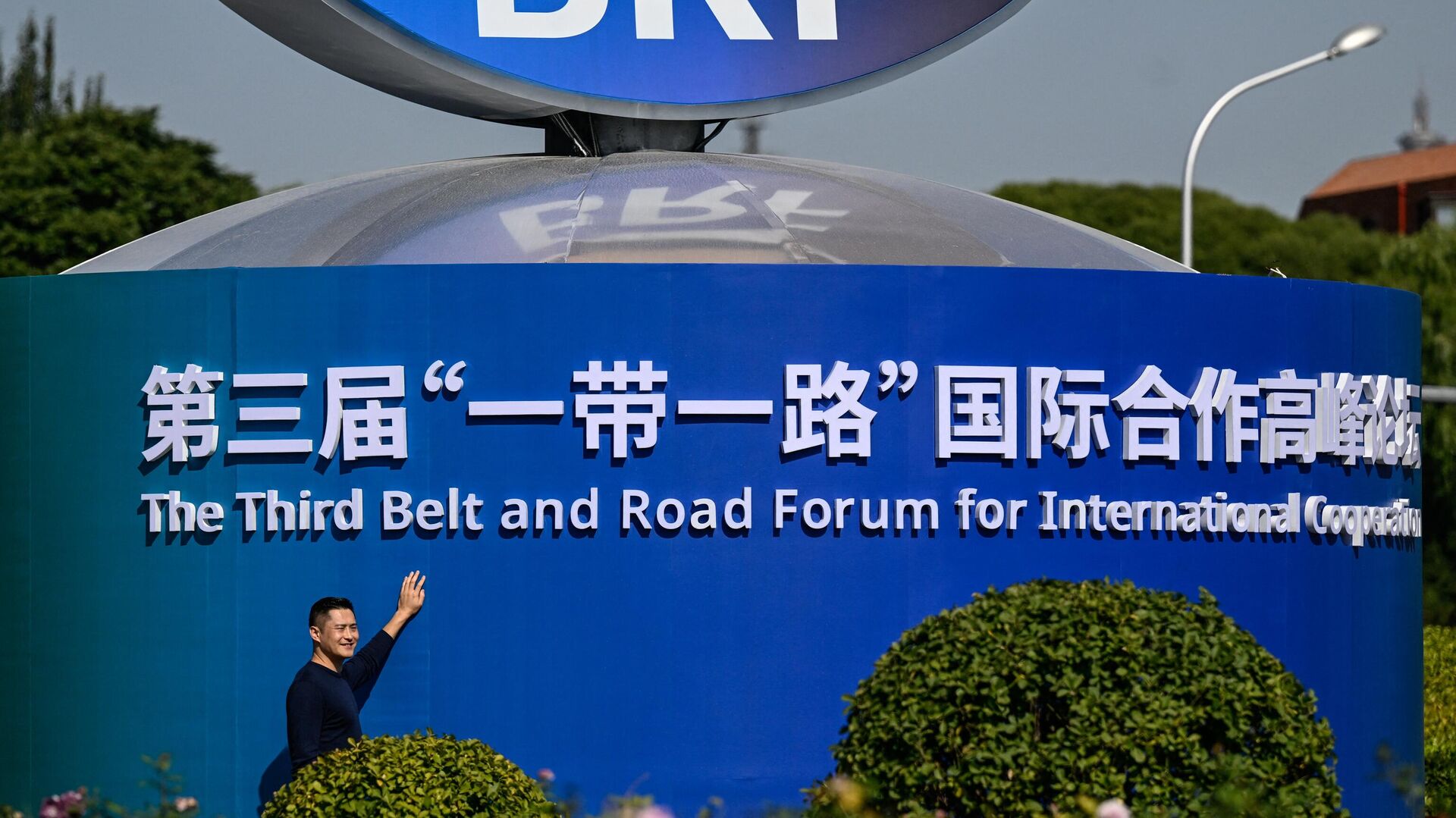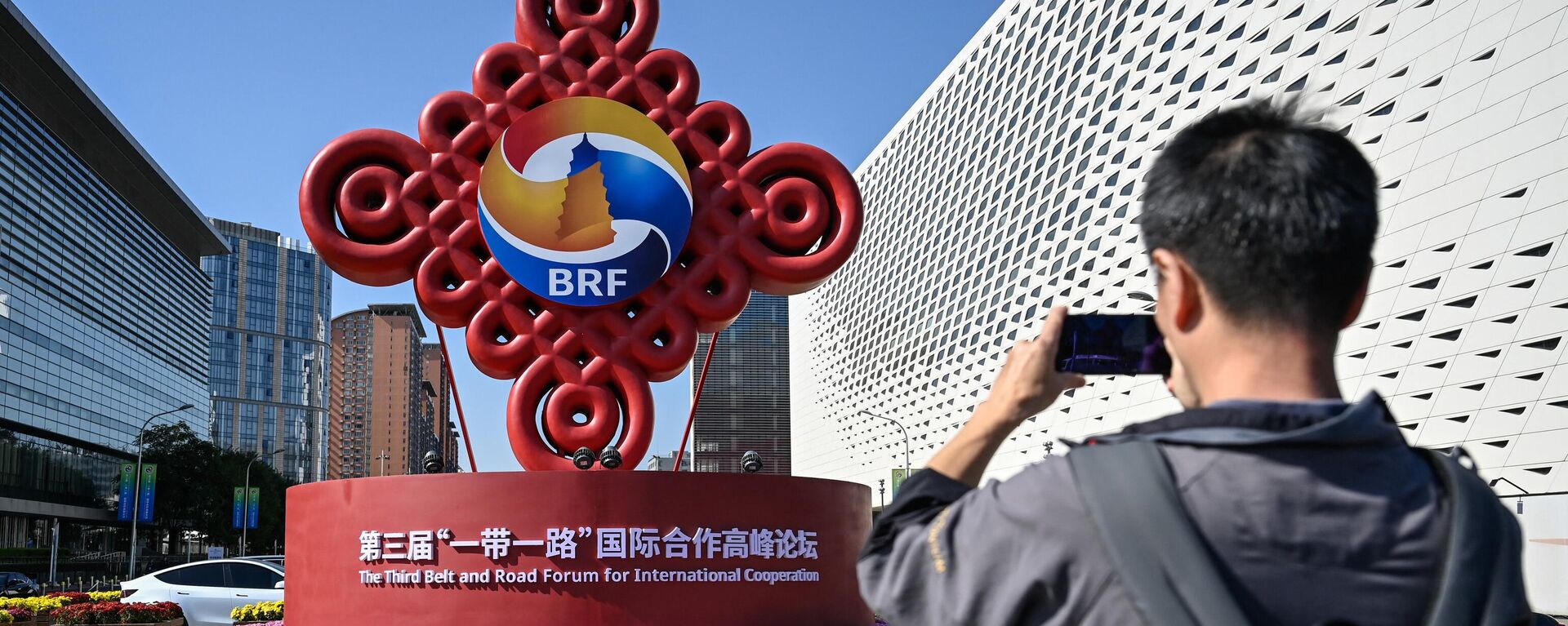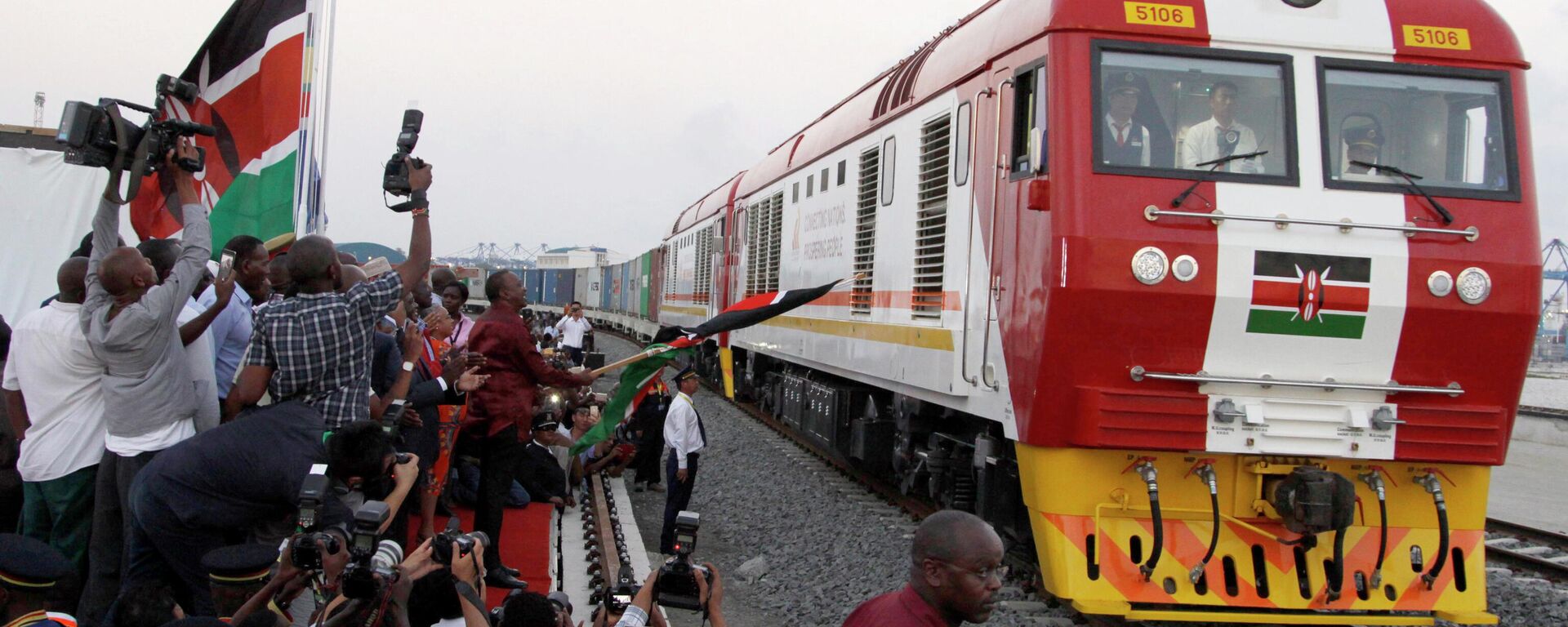https://en.sputniknews.africa/20231016/third-one-belt-one-road-forum-in-china-what-to-expect-and-why-it-matters-1062850470.html
Third 'One Belt, One Road' Forum in China: What to Expect and Why It Matters?
Third 'One Belt, One Road' Forum in China: What to Expect and Why It Matters?
Sputnik Africa
This year's forum in China will be held under the theme "High-Quality Belt and Road Cooperation: Together for Shared Development and Prosperity." Sputnik... 16.10.2023, Sputnik Africa
2023-10-16T18:20+0200
2023-10-16T18:20+0200
2023-10-17T10:33+0200
features
china
international
vladimir putin
xi jinping
russia
beijing
eurasian economic union
russian foreign ministry
belt and road initiative
https://cdn1.img.sputniknews.africa/img/07e7/0a/10/1062833130_0:321:3072:2048_1920x0_80_0_0_9562a97cf86da1f4f1c494061215aae0.jpg
On October 17 and 18, the Chinese capital, Beijing, will host the Third Forum on International Cooperation under the Belt and Road Initiative. The event is dedicated to the international economic and infrastructure development initiative of the same name, launched by Chinese President Xi Jinping in 2013.As China's Foreign Ministry said earlier, delegations from more than 140 countries and over 30 international organizations are expected to attend the 2023 forum, and the number of participants registered for the forum exceeds 4,000 people.Among the African leaders participating in the forum are the President of the Republic of the Congo, Denis Sassou N'guesso, Prime Minister of Ethiopia, Abiy Ahmed, and Vice President of Nigeria, Kashim Shettima.Earlier, in his message of congratulations to Xi on the PRC's 74th anniversary, Putin said that future talks between leaders of countries during the forum will facilitate the further development of all areas of constructive relations between Russia and China for our friendly nations, ensuring security and stability in Eurasia and worldwide.What is 'One Belt, One Road'?"One Belt, One Road" is an international initiative of China to improve existing trade and transportation corridors and create new ones. Its initial goal is to build infrastructure and connect Eurasian countries. The initiative encompasses several areas, including the Silk Road Economic Belt and the Maritime Silk Road.Achievements and Prospects of China InitiativeThe press office of the Chinese State Council recently released a white paper on the implementation of the Belt and Road Initiative.Over the past 10 years, the project has attracted nearly $1 trillion in investment and established more than 3,000 joint cooperation projects. According to the Chinese Ministry of Foreign Affairs, Chinese companies have created 420,000 jobs in countries along the Belt and Road.According to the white paper, the Belt and Road Initiative has made participating countries more attractive to global businesses. For example, cross-border foreign direct investment (FDI) inflows to Southeast Asia, Central Asia and other regions, many of which have joined China's initiative, have been steadily increasing. Thus, Southeast Asia accounted for 17.2% of global FDI in 2022, up 9 percentage points from 2013.In addition, trade and investment among participating countries under the Belt and Road Initiative is growing. From 2013 to 2022, the combined value of imports and exports between China and other members of the initiative reached $19.1 trillion, with an average annual growth rate of 6.4 percent.One of the project's achievements over the years was the launch of the China-Europe container train. The route connected 217 cities in 25 countries.Russia & 'One Belt, One Road'Speaking at a meeting of the Valdai International Discussion Club, the Russian president said that Moscow and Beijing will implement joint infrastructure development plans, including the One Belt, One Road initiative. The Russian leader then called the initiative "very promising."One of the areas of cooperation between China and Russia related to the Chinese initiative is the pairing of the development plans of the Eurasian Economic Union (EAEU) and the Silk Road Economic Belt. In connection with the initiative, China views Russia as a key partner whose interests should be taken into account. In this regard, in May 2015, Moscow and Beijing reflected the respective approaches of the parties in the Joint Statement of the Russian Federation and the People's Republic of China on cooperation regarding the construction of the EAEU and the Silk Road Economic Belt.The Russian Foreign Ministry previously noted that the EAEU's interaction with China is based on the agreement on trade and economic cooperation between the EAEU and Beijing, which entered into force in 2019.Russian Deputy Foreign Minister Andrey Rudenko emphasized that Moscow and Beijing are working on concluding new agreements in the economic sphere during Putin's planned trip to China.Previous ForumsThe first forum of international cooperation "One Belt, One Road" was held in Beijing on May 14-15, 2017. It was attended by presidents and prime ministers of 29 countries, including Russian President Putin. In total, more than 1,600 participants from more than 140 countries and more than 80 international organizations attended the event. The next forum took place in Beijing two years later, on April 25-27, 2019. It was attended by 38 heads of state and government, the total number of participants exceeded 6,000 people, representing more than 150 states and 92 international organizations. President Putin also took part in this forum.
https://en.sputniknews.africa/20231016/world-leaders-arrive-in-china-for-third-belt-and-road-forum-for-international-cooperation-photos-1062832757.html
https://en.sputniknews.africa/20230814/how-is-china-overtaking-west-in-africa-1061331518.html
china
russia
beijing
Sputnik Africa
feedback@sputniknews.com
+74956456601
MIA „Rossiya Segodnya“
2023
Maxim Grishenkin
https://cdn1.img.sputniknews.africa/img/07e7/0a/17/1063018107_0:0:1104:1103_100x100_80_0_0_03090c85a11f5d2e8a19cf1d989443c9.jpg
Maxim Grishenkin
https://cdn1.img.sputniknews.africa/img/07e7/0a/17/1063018107_0:0:1104:1103_100x100_80_0_0_03090c85a11f5d2e8a19cf1d989443c9.jpg
News
en_EN
Sputnik Africa
feedback@sputniknews.com
+74956456601
MIA „Rossiya Segodnya“
Sputnik Africa
feedback@sputniknews.com
+74956456601
MIA „Rossiya Segodnya“
Maxim Grishenkin
https://cdn1.img.sputniknews.africa/img/07e7/0a/17/1063018107_0:0:1104:1103_100x100_80_0_0_03090c85a11f5d2e8a19cf1d989443c9.jpg
china, international, vladimir putin, xi jinping, russia, beijing, eurasian economic union, russian foreign ministry, belt and road initiative
china, international, vladimir putin, xi jinping, russia, beijing, eurasian economic union, russian foreign ministry, belt and road initiative
Third 'One Belt, One Road' Forum in China: What to Expect and Why It Matters?
18:20 16.10.2023 (Updated: 10:33 17.10.2023) Longread
This year's forum in China will be held under the theme "High-Quality Belt and Road Cooperation: Together for Shared Development and Prosperity." Sputnik Africa explains why the event was put together, what its significance is and which notable leaders are going to attend the venue.
On October 17 and 18, the Chinese capital, Beijing, will host the Third Forum on International Cooperation under the Belt and Road Initiative. The event is dedicated to the international economic and infrastructure development initiative of the same name, launched by Chinese President Xi Jinping in 2013.
As China's Foreign Ministry said earlier, delegations from more than 140 countries and over 30 international organizations are expected to attend the 2023 forum, and the number of participants registered for the forum exceeds 4,000 people.
Among the world leaders attending the event are Russian President Vladimir Putin, Serbian President Aleksandar Vucic, Hungarian Prime Minister Viktor Orban, Vietnamese President Vo Van Thuong and others.
Among the African leaders participating in the forum are the President of the Republic of the Congo, Denis Sassou N'guesso, Prime Minister of Ethiopia, Abiy Ahmed, and Vice President of Nigeria, Kashim Shettima.
Earlier, in
his message of congratulations to Xi on the PRC's 74th anniversary, Putin said that future talks between leaders of countries during the forum will facilitate the further development of all areas of constructive relations between Russia and China for our friendly nations, ensuring security and stability in Eurasia and worldwide.
What is 'One Belt, One Road'?
"One Belt, One Road" is an international initiative of China to improve existing trade and transportation corridors and create new ones.
Its initial goal is to build infrastructure and connect Eurasian countries. The initiative encompasses several areas, including the Silk Road Economic Belt and the Maritime Silk Road.
Achievements and Prospects of China Initiative
The press office of the Chinese State Council recently released a white paper on the implementation of the Belt and Road Initiative.
Over the past 10 years, the project has attracted nearly $1 trillion in investment and established more than 3,000 joint cooperation projects. According to the Chinese Ministry of Foreign Affairs, Chinese companies have created 420,000 jobs in countries along the Belt and Road.
In total, more than 150 countries and more than 30 international organizations are involved in one way or another in implementing the Chinese initiative. Beijing has signed more than 200 cooperation agreements with them.
According to the white paper, the Belt and Road Initiative has made participating countries
more attractive to global businesses.
For example, cross-border foreign direct investment (FDI) inflows to Southeast Asia, Central Asia and other regions, many of which have joined China's initiative, have been steadily increasing. Thus, Southeast Asia accounted for 17.2% of global FDI in 2022, up 9 percentage points from 2013.
In addition, trade and investment among participating countries under the Belt and Road Initiative is growing. From 2013 to 2022, the combined value of imports and exports between China and other members of the initiative reached $19.1 trillion, with an average annual growth rate of 6.4 percent.
According to the press office of the Chinese State Council, the Silk Road Fund, which serves the implementation of the initiative, has signed agreements on 75 projects under the Belt and Road Initiative.
One of the project's achievements over the years was the launch of the China-Europe container train. The route connected 217 cities in 25 countries.
Russia & 'One Belt, One Road'
Speaking at a meeting of the Valdai International Discussion Club, the Russian president said that Moscow and Beijing will implement joint infrastructure development plans, including the One Belt, One Road initiative. The Russian leader then called the initiative "very promising."
One of the areas of cooperation between
China and Russia related to the Chinese initiative is the pairing of the development plans of the Eurasian Economic Union (EAEU) and the Silk Road Economic Belt.
Russia is interested in using the additional opportunities for deepening Eurasian economic integration provided by the "One Belt, One Road" initiative, as well as in implementing major joint projects.
In connection with the initiative, China
views Russia as a key partner whose interests should be taken into account. In this regard, in May 2015, Moscow and Beijing reflected the respective approaches of the parties in the Joint Statement of the Russian Federation and the People's Republic of China on cooperation regarding the construction of the EAEU and the Silk Road Economic Belt.
The Russian Foreign Ministry previously noted that the EAEU's interaction with China is based on the agreement on trade and economic cooperation between the
EAEU and Beijing, which entered into force in 2019.
Russian Deputy Foreign Minister Andrey Rudenko emphasized that Moscow and Beijing are working on concluding new agreements in the economic sphere during Putin's planned trip to China.
The first forum of international cooperation "One Belt, One Road" was held in Beijing on May 14-15, 2017. It was attended by presidents and prime ministers of 29 countries, including Russian President Putin. In total, more than 1,600 participants from more than 140 countries and more than 80 international organizations attended the event.
The next forum took place in Beijing two years later, on April 25-27, 2019. It was attended by 38 heads of state and government, the total number of participants exceeded 6,000 people, representing more than 150 states and 92 international organizations. President Putin also took part in this forum.




